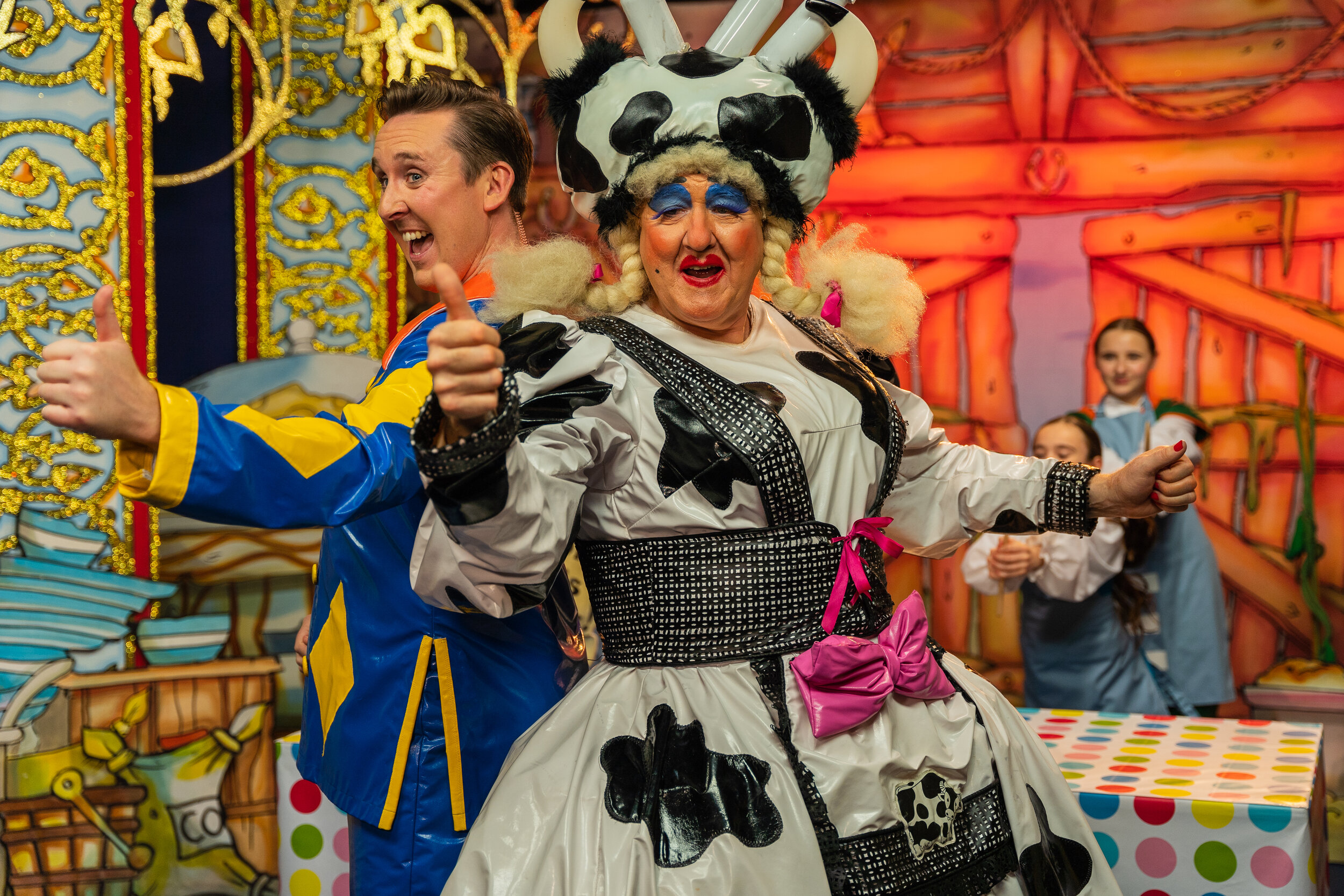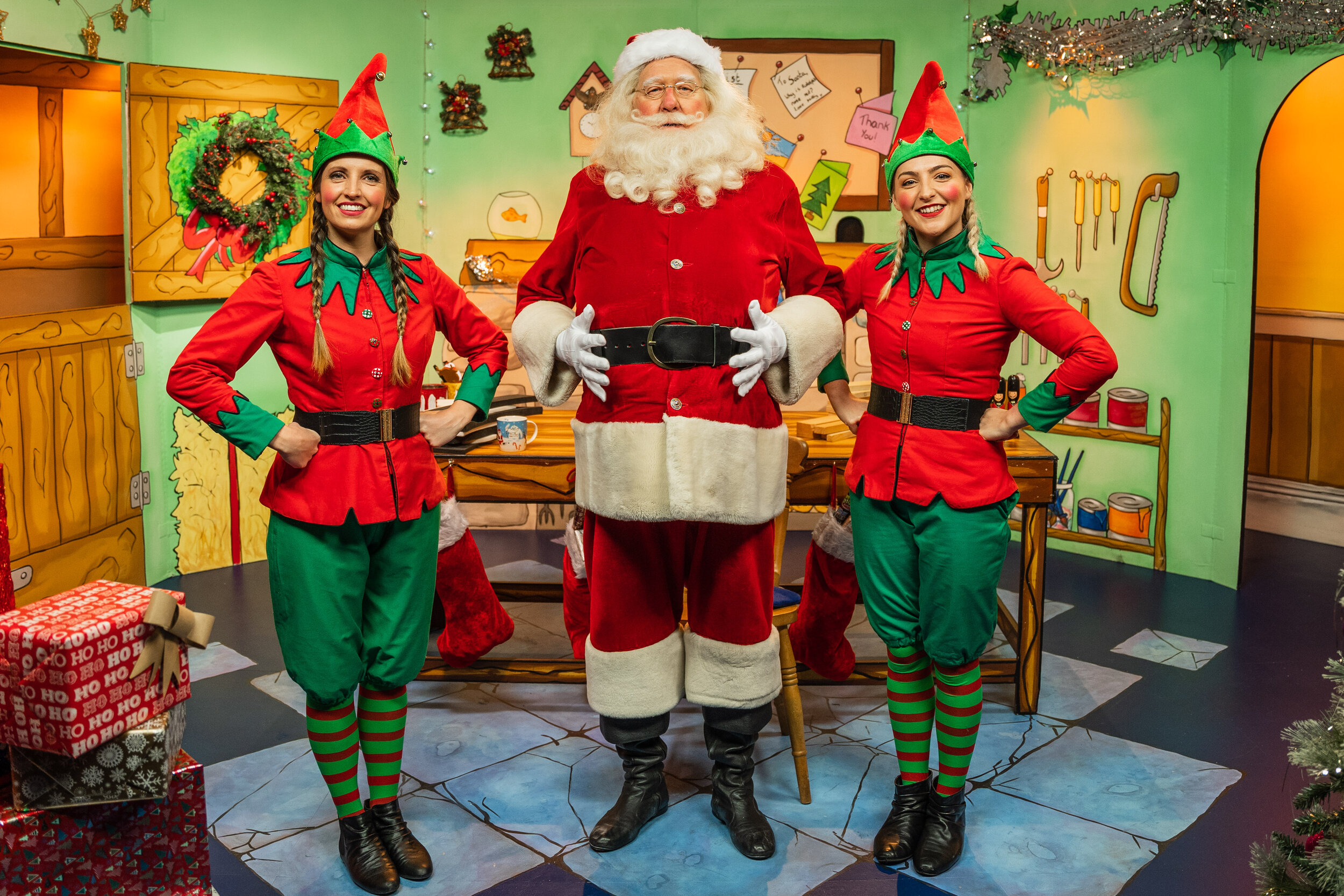“Wouldn’t it be nice to have a Christmas off?”
That’s the dream of everyone who has to regularly work over Christmas, those who misses the ‘traditional’ elements of the season. We’ve not been to a Christmas concert in years and years. For panto producers like us, Christmas is an exhausting, never ending stream of work. It’s endless miles of travel. Its thousands of show reports to read. It’s constant phone calls from our teams with things to sort out. By the end of January, we’re literally on our knees and ready to keel over as the cycle for the following year’s pantomime productions starts all over again, and we wouldn’t have it any other way!
But now we wish we could wake from that dream, because it has become the reality. While we had the dream, we never actually wanted it to happen. Panto is our life. We eat, sleep, breathe and live it. And this year it’s not happening and we’re having Christmas off.
Those endless miles of travel resulted in watching something magical on stage, the pride of watching what our team has achieved, drinks and chats with cast and crew who rapidly become friends and the buzz of hearing an audience screaming with laughter and participating for what is quite often their one and only theatre experience of the year.
Imagine Theatre has now postponed all of its 2020 pantomime productions and we are looking at an unusually quiet Autumn and Christmas period, albeit with some projects in the pipeline. Whilst some theatre has been able to reopen under stage 4 of the government’s reopening roadmap, this stage involves social distancing in auditoriums. To be financially viable, panto needs stage 5 (no social distancing), and we know that won’t be considered until later this year. That’s just too late and risky for panto as we know it to be produced this year. Our last blog (linked here) explained the challenges surrounding producing pantomime and venue reopening. For many venues, it’s just not financially viable for them to reopen until the spring of 2021. Indeed, just this week, Andrew Lloyd Webber and Rebecca Kane Burton brilliantly explained the problems facing the theatre industry to the parliament DCMS select committee. As Andrew said, we desperately need a date for the reopening theatres; we are at the point of no return.
The very latest deadline to make the 2020 panto season happen was set as 3rd August. Even then, it would have been an enormous struggle to have fitted a years work into just 4 months to make it happen. Once that date passed, panto season as we know it was gone. There are some venues out there planning socially distanced productions, but these will not be at the same scale as we are used to – they can’t be because of the rules and regulations we are now required to follow.
We always get asked the same question “Ah, you’re a panto producer, what do you do the rest of the year?” – well, the answer is simply that we do panto. All year, every year. It’s a year round job.
We describe the preparation for pantomime season as like being on a train. The train spends quite a bit of time in the station, being prepared and loaded for its journey ahead. (February to mid August – casting, pre-production planning, marketing, scenic and costume preparation etc). Once the train is ready to leave the station (things usually really ramp up in mid August), it gently gathers speed until it’s at full pelt (usually in the middle of September) and the only option you have is to work at full speed to keep up with it. Autumn and Winter usually pass in a total blur for us at head office. It only starts to slow from its journey in mid January, and comes to a full stop by the end of the month, ready to start the cycle all over again.
As we write, the train should have left the station and be running almost at full pelt. This year it hasn’t even been loaded to set off on its journey. We stopped preparing it in early Spring when it became apparent that we might lose the 2020 panto season, and we would need to batten down the hatches to survive.
Its mind-boggling that we are in this situation. From having our most successful season ever in 2019, to staring into the abyss of a total loss of the 2020 pantomime season and associated financial loss for the year, we can’t quite comprehend what is happening. Our amazing head office team are still on furlough and haven’t seen their desks in months; our usually busy casting department hasn’t opened a CV this year, not one pre-production planning meeting has taken place and our offices and stores are quiet.
It’s not just our head office team that is affected either. Theatre is a finely tuned ecosystem of companies and individuals all reliant on each other. Our suppliers haven’t been awarded contracts this year; our transport companies won’t be moving scenery and costumes; our casts, crews, creatives, musicians etc don’t have work from us; our theatres aren’t selling tickets and won’t see their ticket, booking fee and secondary spend incomes; restaurants, taxi companies, hotels and shops won’t see the throughput of audience members. The list goes on. It’s not just about a production company losing some work – it’s about the millions of people that our panto season impacts. And we are just one cog in the world of the UK pantomime industry, and an even smaller cog in the UK theatre scene as a whole.
We are regularly asked “Surely it’s not as bad in the theatre industry as people are making out?” and the only answer we can give is “yes it really is”.
That is inevitably followed by “But the government has given a big rescue package, so how come?”
There has indeed been a £1.57bn rescue package announced but it’s for ALL Arts, not just theatre. It covers Museums, Galleries, Libraries, Music venues, Theatres and all Arts and Cultural related businesses, to enable their survival until 31st March 2021. Its breakdown is:-
£1.15bn in grants (£880m) and loans (£270m)
£100m in support for the English Heritage Trust & national cultural organisations in England
£120m in capital investment for infrastructure projects paused by Corona
£188m for the devolved administrations (£33m NI, £97m Scotland, £59m Wales)
This money was announced at the start of July, with applications submitted in August . It won’t be awarded until October for distribution later that month or even into November.
In England, of the £270m available in loans, the minimum amount that can be applied for is £3m. This means the maximum number of organisations that can benefit from the loan scheme is 90. Everyone else in England (the tens of thousands of theatres, venues, producers, agents, suppliers etc) will all be applying for the remaining £880m in grants. Whilst this is still a significant amount of support, it might not be enough to go around, so there is a real danger that not all companies and venues will survive.
Oliver Dowden stated that it’s ‘enough to save the Crown Jewels’. That’s absolutely fantastic news because they are so important to our countries cultural provision – but in the theatre world, the crown jewels need a head to sit on (the venues) and a backbone to support them (producers like us, actors, creatives, crew, freelancers, colleges, agents, suppliers etc who are absolutely critical to the supply chain and finely tuned theatre ecosystem). Without a strong head and backbone in place, the crown jewels may topple as their supports begin to collapse around them. Eventually the Crown Jewels will fall; you can’t keep them going if there is nothing for them to sit atop of.
Our sector, in the vast majority of cases, has seen absolutely zero income since March (and indeed many theatres have had to refund tens of thousands of pounds worth of ticket money), so the industry is living off its financial reserves to keep businesses afloat and viable. Like many businesses in our sector, our staff are on furlough, but the overheads of premises rent, lighting, electricity, phones, broadband etc don’t just go away. They still have to be paid each month. And now we are having to start contributing towards furlough salaries, with no income stream to help out.
A business can only last as long as it has reserves and the longer this goes on, the less viable many businesses within our sector will become. Theatre usually relies on those reserves to operate and stay open. As producers, quite often we get paid for a show AFTER it has taken place. In these cases, we have to pay for pretty much everything up front, and a production or tour may be 18 months in the planning, preparation and roll out before the box office settlements come back in. So no reserves means cash flowing or paying for these projects could be a challenge. That’s why our industry is lasting as long as it is – because many have reserves. But what when those reserves are gone? How do we collectively get restarted?
Our heart goes out to all those theatres who rely on the income from pantomime to survive. Panto is, in many cases, the most financially critical production a theatre will stage all year. It’s the show which brings the most people through the doors in the shortest space of time, and more often than not, underpins the finances of a venue for the rest of the year. It’s going to be incredibly hard for some in our sector to survive this crisis, through absolutely no fault of their own.
We are thinking of all the theatre and live events practitioners who have lost their livelihood this year. There are countless thousands of industry freelancers for whom there has been little work or support since March. This is real life for them, and the ripples of this pandemic are far reaching.
At the end of October 2020 the furlough scheme ends, and many employers within our industry will have no choice but to turn to shortened hours, layoffs and redundancies in order to survive. Taking steps like this isn’t just breaking up a team of work colleagues – it’s breaking up a family of expert theatrical practitioners, many of whom have taken years to learn their craft. Its emotionally draining for everyone involved – us as business owners, for our wonderful team and their families and for everyone who would usually work with us each Christmas. We find ourselves having to make decisions we desperately don’t want to and should not be having to make.
Yes, there is some theatre starting to happen now (mainly smaller scale productions which are financially viable under social distancing) and lots of ideas and plans are being discussed and rolled out, so there are signs of new growth. The question is whether this regrowth can happen fast enough and to a big enough scale to keep the industry afloat for long enough. We have our fingers and toes crossed.
In order for our wonderful theatre industry to survive until it can restart properly, there are some things which can be promoted widely to ensure it can climb out of its current predicament and rebuild.
If you hear of a venue or production company running an online production but you’re not sure, please give it a go. Not only will your money really help them, but you might be pleasantly surprised just how good it is.
Get back into theatres where you can – if socially distanced performances are happening and you feel confident to go back, please give it a try. These productions will need to sell out to be financially viable.
Show a commitment to your local venue by purchasing season tickets or venue memberships – these also come with longer term benefits such as cut price tickets, money off at the bar etc
Buy tickets or vouchers to future productions – once this is all over, theatres are going to need audiences. Perhaps this could be a good Christmas present?
If you are due a refund and can afford to, please keep your money in the theatre until such point as you can rebook another performance. Part of the problem theatres face is having to refund ticket monies.
If you can afford to, donate to your theatre. Many theatres are charities and the money will help them survive.
Write to your local MP and ask for more help. The theatre industry will need long term help and support to survive and thrive again, including an extension of furlough to help until such time as we are able to reopen fully.
If you watch a performance, on line, for free, where possible make a small donation towards the costs of streaming the production.
Give the theatre world a shout out on social media and show your support – especially if you’ve done any of the points above.
Oliver Dowden has also been talking about ‘Operation Sleeping Beauty’ – a scheme to get theatres back open as soon as possible. This is wonderful news and it’s fantastic to hear that the DCMS and Government appreciate how critical theatre is to the country’s economy… but please remember Oliver, that theatre can’t restart overnight. It takes months and months of planning and preparation for productions to be ready, and many companies have had no option but to make some of their staff redundant to make their finances balance. Giving us the ‘go’ to reopen with full(er) audiences in October or November sadly means that the majority of pantomimes still can’t take place this Christmas. We just don’t have time to pull those productions together now. Oh, and there’s still those small matters of us not being able to get insurance to cover loss of income due to COVID for our shows, and the risk of a localised lockdown.
We really appreciate all the kind words of support and understanding that have been sent to us over the last few months. Thank you. We are sending so much love and support to the theatres, casts, creatives, crew, suppliers and absolutely everyone involved in creating the magic across theatre and pantoland. We WILL come back bigger and stronger than ever in 2021, creating wonderful magic and memories as we go.
Stay well and stay safe
Steve and Sarah x












